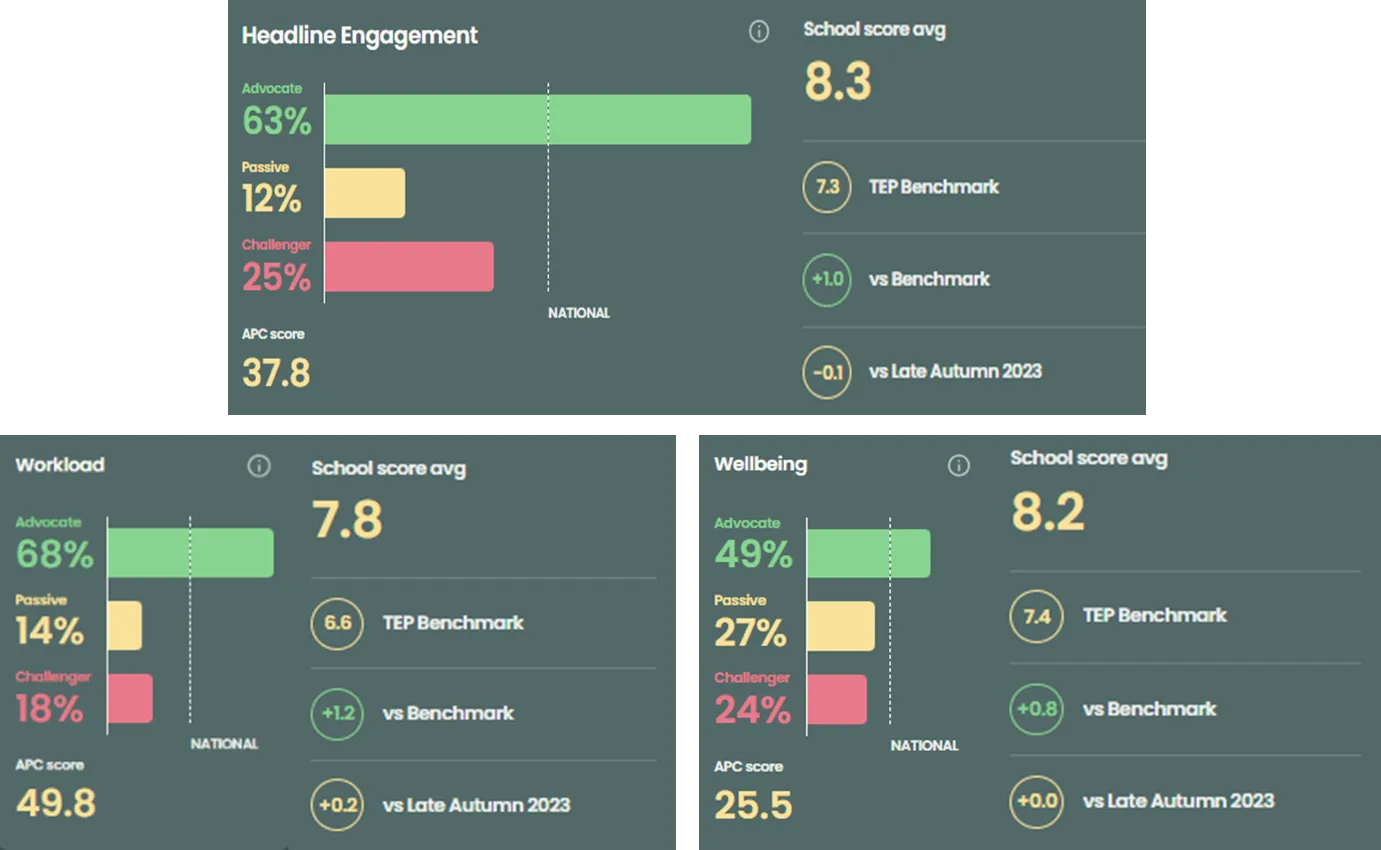.webp)
Key TEP takeaways
- Validation of current practices through national benchmarking and positive feedback from experienced teachers.
- Recognition of high levels of support from advocates across the school, evidenced by data.
- Identification of areas for improvement, allowing for targeted refinement.
- Confirmation of existing issues within certain faculties, providing evidence to address and resolve them.
- Transparent sharing of wider results with all staff to demonstrate high scores against national benchmarks, aiming to gain support from the challengers and maintain togetherness across the college.
Over the last 6 years, High Tunstall College of Science has undergone a major redevelopment costing £20 million. Thanks in part to this redevelopment, the College is now oversubscribed across all year groups. It has also attained the Inclusion Quality Mark (IQM) and is recommended as a centre of excellence for inclusion. They are fully staffed in all areas, with some areas overstaffed, and no reliance on supply teachers since the Covid-19 pandemic. Staff absence has reduced significantly and now remains comparatively low (just 2% on the day we spoke), despite frequent trips organised by the school.
I was pleased to meet with Headteacher Mark Tilling and Deputy Headteacher Peter Hayward as High Tunstall’s TEP scores are particularly strong in overall headline engagement as well as workload and wellbeing (Figures 1,2 and 3) which is why we were keen to speak to them and explore their approach.

During the interview, Mark emphasised the importance of staff wellbeing, and therefore workload, recognising its direct impact on student wellbeing and progress, stating, "As head I always say everything we do is about the children, but actually if you haven’t got happy staff, you haven’t got happy children."
Before using TEP, Mark and his team used a staff survey which primarily focused on the standard Ofsted staff survey question sets. However, they were attracted to TEP last year due to our live national benchmarking, providing a holistic comparison across 10 drivers, as well as providing headline engagement figures. They aimed to assess the effectiveness of their initiatives and transition from relying on indirect indicators such as staff turnover (just 6%) to the more rigorous approach offered by TEP.
This change resulted in a significantly improved response rate of 93%, compared to 50% with the previous provider. The previous survey flagged surprisingly low scores for workload and wellbeing, so Mark and his team sought to benchmark their performance against national standards, acknowledging that workload and wellbeing are challenging issues across the teaching profession. Despite these challenges, their TEP scores indicate the college’s commitment to generating and maintaining a truly inclusive and sustainable workplace.
Prioritising Staff Wellbeing and Workload Management
At High Tunstall, no teacher exceeds an 80% fortnightly timetable, with any additional hours reserved for catch-up with young people or the occasional cover period. Internal cover procedures maintain consistency and standards, fostering a calm school atmosphere. The benefits of being able to cover internally are consistent teaching, procedures always followed, consistent marking, and constantly maintained standards. The college has good to outstanding behaviour, employing a restorative approach based on the Pivotal Behaviour Management model from Paul Dix. Consistent behaviour management strategies reinforce staff support and maintain a positive learning environment, as shown in High Tunstall’s March 2024 TEP results in Table 1:
.webp)
At High Tunstall student books are not taken home to mark. The marking and assessment policy centres around live marking during lessons, with only assessments and exams being taken home if necessary. Feedback focuses on student engagement and progress, with the leaders encouraging the use of interactive tools like mini whiteboards and verbal feedback. Peter explains, "Feedback should be more work for the recipient than the donor, and it’s got to move the learner forward."
In addition, leaders and staff worked collaboratively through an INSET day where communication was identified as an area to improve. Communication within the college has therefore been refined through a communications policy, which includes, for example, that no weekend emails should be sent except for one containing necessary resources for the week ahead. Collaborative planning sessions also occur fortnightly across all departments, as one of the initiatives that High Tunstall has taken from the Department for Education's workload reduction toolkit in the last few years.
There is a big focus on sustaining staff wellbeing at High Tunstall and there are various initiatives in place to support this including flexible wellbeing days, accessible to all staff, and personalised celebrations like Length of Service awards and end-of-term events. Access to onsite facilities like the gym, swim, physiotherapy, and counselling services further support staff wellbeing.
Mark concludes, "We're always trying to reward and give people what they deserve for the job they do."
Another strategy to reduce workload for staff has been the introduction of Synergy, – which sits on top of the school’s MIS and combines registers, achievement and behaviour points, seating plans, setting homework, storing resources and communicating with parents into one single system – meaning staff only open one system each day, rather than five different ones. Additionally, Synergy is used to support during staff absence. Teachers load lesson resources and link them to the lesson, if they are absent the teacher who is covering can simply navigate to the lesson and the content is ready to go. This means that the absent teacher is able to rest and disconnect and cover teachers or colleagues in their department don’t have to scramble for resources or activities. Students are taught the same high-quality lesson and standards, and behaviour can be maintained.
What’s next at High Tunstall?
- Formalised wellbeing days and expanded use of Synergy to streamline communications.
- Addressing concerns about the pace of change: while feedback from a single staff member highlighted challenges in keeping up with initiatives, Mark and his team remain committed to transparent over-communication about their strategies. They aim to enhance communication through more effective use of bulletins, minimizing open-floor briefings, and aligning actions with their four key strategies.
- Focus on sustainability: Mark outlined the importance of community involvement in all future planning, allocating £1.4 million annually towards inclusion. With a strong commitment to serving the local community, sustainability remains a top priority despite potential funding uncertainties and a possible change in government.
Do you want to identify similar insights in your own institution?
Reach out to our team at hello@tep.uk and we can get you started in time for our Summer Census running 17th - 28th June.

.webp)
%20(1).webp)





.png)

